Signs of the Times • 18 February 2016 • No. 59
Special themed issue: “In God We Trust”
God as national mascot
Divine patronage asserted
¶ Processional. “Star Spangled Banner,” Jimi Hendrix. 
The Angel Oak Tree (right), on Johns Island near Charleston, SC, is estimated to be 400-500 years old. It is 66.5 feet tall, has a circumference of 28 feet, and its longest branch measures 187 feet in length.
¶ Call to worship. “Star Spangled Banner,” Lady Gaga.
¶ Invocation. “O, Lord, we are about to join battle with a vastly superior number of the enemy, and, Heavenly Father, we would mightily like for you to be on our side and help us. But if You can't do it, for Christ's sake don't go over to the Mexicans, but just lay low and keep in the dark, and You will see one of the dangest fights you've ever seen. Charge!" — Captain Jack Hays of the Texas Rangers during the Mexican-American War, shortly before leading his troops into battle at Palo Alto, near the modern-day town of Brownsville, Texas.
¶ Intercession—A Lenten love song, from the church to God. “Hug me, squeeze me, love me, tease me / Till I can't, till I can't, till I can't take no more of it / Take me to the water, drop me in the river / Push me in the water, drop me in the river / Washing me down, washing me down.” —“Take Me to the River,” written by Al Green and Mabon "Teenie" Hodges, performed here by Syl Johnson
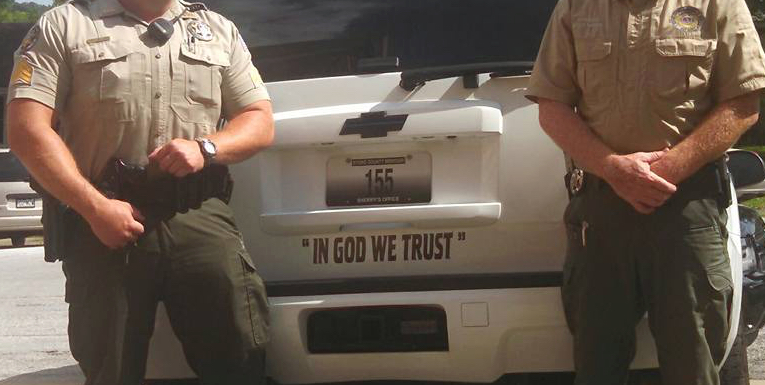 ¶ Confession. “Day of judgment, God is calling / On their knees the war pig's crawling / Begging mercy for their sins / Satan laughing spreads his wings / oh lord yeah!” —“War Pigs,” Black Sabbath, performed by First Aid Kit
¶ Confession. “Day of judgment, God is calling / On their knees the war pig's crawling / Begging mercy for their sins / Satan laughing spreads his wings / oh lord yeah!” —“War Pigs,” Black Sabbath, performed by First Aid Kit
¶ Words of assurance. “When I come to die, / When I come to die, / When I come to die, / Give me Jesus.” —“Give Me Jesus,” a cappella rendition by the Apex High School chorus
IN GOD WE TRUST
God-promotion is a recurring theme in US history, both as a response to declining confidence in the state of the nation and as an ideological struggle against enemies. What follows is a bit of background.
¶ Sheriffs in Rutherford County, NC, are but the latest to sport “In God We Trust” bumper stickers on their cruisers—in this case, donated by a local church. “Sheriff Chris Francis wanted to use the decals as a way of showing patriotism.” Similar measures have taken place in several states, and several states now have license plates with "In God We Trust" inscribed. (For more background, see Elahe Izadi’s “Why officers are putting ‘In God We Trust’ bumper stickers on their patrol cars” and Ken Paulson’s “When police embrace ‘In God We Trust’" commentary. 
¶ “In God We Trust” was adapted from the last stanza of Francis Scott Key’s “The Star-Spangled Banner,” which says, “And this be our motto: ‘In God is our trust.’”
¶ President Theodore Roosevelt disapproved of the motto’s appearance on coins. In The New York Times on 14 November 1907, he wrote, “My own feeling in the matter is due to my very firm conviction that to put such a motto on coins not only does no good but does positive harm, and is in effect irreverence, which comes dangerously close to sacrilege.”
¶ The US Mint stamped selected coins with “In God We Trust” during the Civil War when God’s patronage of the Union was at stake.
The Reverend M. R. Watkinson, in a letter dated November 13, 1861, petitioned the Treasury Department to add a statement recognizing ‘Almighty God in some form in our coins" in order to "relieve us from the ignominy of heathenism.’ At least part of the motivation was to declare that God was on the Union side in the Civil War. —see Wikipedia for more background
¶ God-promotion got seriously underway in the 1930s as a way of opposing US President Franklin D. Roosevelt’s “New Deal” legislation. Following World War II, the movement expanded greatly—with what the courts have ruled “ceremonial  deism,” encouraging school children’s “love of country,” and serving “commercial interests”—when the Soviet Union and its officially-atheistic constitution became Enemy No. 1. —See Kevin M. Kruse’s detailed documentation in his book, One Nation Under God: How Corporate America Invented Christian America.
deism,” encouraging school children’s “love of country,” and serving “commercial interests”—when the Soviet Union and its officially-atheistic constitution became Enemy No. 1. —See Kevin M. Kruse’s detailed documentation in his book, One Nation Under God: How Corporate America Invented Christian America.
¶ Gott mit uns ("God with us") is a phrase inscribed on German soldiers’ belt buckles in World War II and commonly used on armor in the German military from the German Empire to the end of the Third Reich, although its historical origins are far older. The Imperial Russian motto, "Съ нами Богъ!" ("S nami Bog!"), also translates the same.
¶ "In God we trust. On Marines we rely." —anonymous
¶ Reference to “In God We Trust” was a central element to the plot of the 1994 version of the film Miracle on 34th Street. In the final scenes of the movie, the judge decides that, since the Department of the Treasury can have faith in God with no hard evidence, the State of New York can have faith in San ta Claus with no hard evidence as well.
ta Claus with no hard evidence as well.
¶ “In God we trust. All others we virus scan.” —anonymous
¶ “By April 1953 US Postmaster General Arthur E. Summerfield found his office buried beneath an avalanche of letters and telegrams from citizens demanding the words “In God We Trust” appear on new stamps. . . . “ The phrase “had appeared once before on a 1928 stamp, which celebrated the sesquicentennial of the Valley Forge encampment with an image—quite familiar to cold warriors—of Washington kneeling in prayer. . . .” By 1954 “the Postal Service unveiled a new eight-cent stamp [the price of international postage at the time] bearing the motto in a red arch over an image of the Statue of Liberty. . . . Over 200 million ‘In God We Trust’ stamps would carry letters around the world each year, a ‘beacon of hope and opportunity to oppressed peoples everywhere,’ as 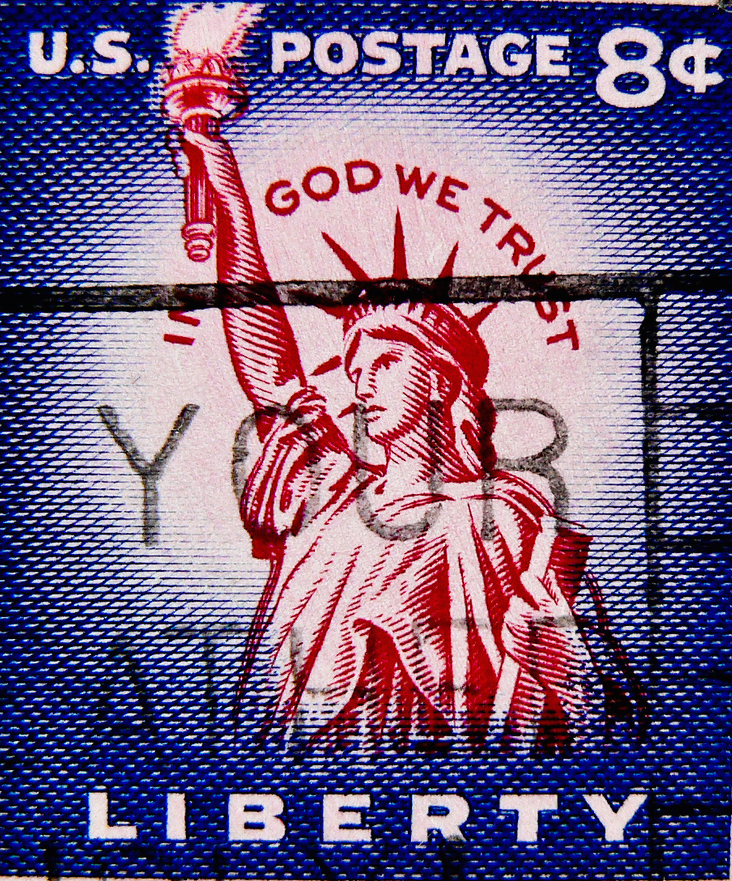 Summerfield put it. —Jonathan P. Herzog, The Spiritual-Industrial Complex: America’s Religious Battle Against Communism in the Early Cold War
Summerfield put it. —Jonathan P. Herzog, The Spiritual-Industrial Complex: America’s Religious Battle Against Communism in the Early Cold War
¶ The phrase “under God” wasn’t added to the Pledge of Allegiance until 1954. By the way, some interesting history: The U.S. Pledge of Allegiance was written in 1892 by Rev. Francis Bellamy, a Baptist pastor and leading advocate of socialism.
¶ In 1955 Congress approved a second national motto, “In God We Trust,” to stand beside the original, “E Pluribus Unum” (“out of many, one”). Some deny that “E Pluribus Unum” was the nation’s motto since it was not explicitly approved as such by an act of Congress—though Congress did approve the Great Seal of the US, on which the phrase appears.
¶ In 1957 “In God We Trust” was added to all US currency.
¶ The “National Prayer Breakfast” (originally, a "Presidential Prayer Breakfast") tradition of bringing together political leaders began in 1953, by Abraham Vereide, who also founded, in 1935, the secretive “Fellowship” (aka “The Family” and “The International Foundation”) as one form of opposition to US President Franklin D. Roosevelt’s “New Deal” legislation and, since then, in support of laissez-faire economic policy  (which, currently, is the meaning behind most public use of the word freedom).
(which, currently, is the meaning behind most public use of the word freedom).
¶ “In God we trust. All others pay cash.” —anonymous
¶ “In 1962, when the Supreme Court ruled (Engel v. Vitale) that government-directed prayer in public schools was unconstitutional, the Senate Judiciary Committee proposed three constitutional Amendments to protect prayer in the schools. The Cold War setting for the hearings was obvious. Virginia Senator A. Willis Robertson said that, without the Amendments, ‘there will be no material difference between our Government and that imposed upon the Soviet Union by the Politburo.’” —For more information on the use of “so help me God” in oaths of office, see David B. Parker, “‘So Help Me God’ and the Presidential Oath,” History News Network.
¶ In 1970 the Ninth Circuit US Court of Appeals (Aronow v. United States, challenging the constitutionality of having “In  God We Trust” on US currency) ruled that the phrase “in God we trust” has no “religious significance,” and its meaning is reduced to “spiritual and psychological value” of a certain “inspirational quality.” Citing an earlier court decision (Engel v. Vitale, 1962), the court affirmed that prayer in public schools and other “patriotic and ceremonial” occasions are merely an encouragement of school children “to express love for our country.”
God We Trust” on US currency) ruled that the phrase “in God we trust” has no “religious significance,” and its meaning is reduced to “spiritual and psychological value” of a certain “inspirational quality.” Citing an earlier court decision (Engel v. Vitale, 1962), the court affirmed that prayer in public schools and other “patriotic and ceremonial” occasions are merely an encouragement of school children “to express love for our country.”
¶ The US Fifth Circuit Court (Madalyn Murray O’Hair v. W. Michael Blumenthal, 1979) claims that the "primary purpose of the slogan [‘In God We Trust’] was secular."
¶ The phrase “ceremonial deism” was first coined by then-dean of Yale Law School Eugene Rostow and first used in a Supreme Court decision by Justice Brennan’s dissenting opinion in Lynch v. Donnelly in 1984, saying that such expressions are “protected from Establishment Clause [referring to the First Amendment to the US Constitution] scrutiny chiefly because they have lost through rote repetition any significant religious content.”
¶ In that same Supreme Court case, which involved the constitutionality of a courthouse Christmas nativity scene in Pawtucket, RI, Chief Justice Warren Burger wrote that the practice "engenders a friendly community spirit" and "serves the commercial interests" of the merchants.
¶ “In God we trust. All others will be audited.” —anonymous
¶ Just to be sure, Congress has on three separate occasions in recent years reaffirmed “In God We Trust” as the nation’s motto. In 2002 the House of Representatives approved a new law that said the old law (Section 302, Title 36, US Code) should not be changed! In 2006 the Senate reaffirmed “the concept embodied in the motto.” Then, in 2011, Rep. J.  Randy Forbes (R-Va.) made the motion to reaffirm, again, “In God We Trust” as the nation’s motto and encourage its display in all public schools and government buildings, saying Americans need “that kind of inspiration” in tough economic times.
Randy Forbes (R-Va.) made the motion to reaffirm, again, “In God We Trust” as the nation’s motto and encourage its display in all public schools and government buildings, saying Americans need “that kind of inspiration” in tough economic times.
¶ Default piety. “I couldn’t think of any new prayers, so I just said the Pledge of Allegiance instead.” —“The Family Circus” cartoon character Dolly, to her mother at bedtime
¶ Lenten piety for the impious. “There’s a raucousness to God, in God, of God, by God, / that the orderly mind cannot abide. . . .” —continue reading Ken’s Sehested’s poem, “Raucous: God’s mutiny against Lenten tedium and patriotic pablum,” particularly if Lenten piety gets wearisome or politicians’ God-promotion makes atheism an attractive option
 ¶ Hymn of praise. “Eternal Father, Strong to Save,” the “Navy Hymn,” performed here by the U.S. Navy Band Sea Chanters.
¶ Hymn of praise. “Eternal Father, Strong to Save,” the “Navy Hymn,” performed here by the U.S. Navy Band Sea Chanters.
¶ "Patriotism is the last refuge of the scoundrel.” —British political essayist Samuel Johnson, 1774
¶ Preach it. “This people honor me with their lips, but their hearts are far from me.” —Jesus, repeating a statement from the prophet Isaiah (Mark 7:6, Matt. 15:8; cf. Is. 29:13)
¶ Lectionary for Sunday next. “The Maître D’ of Heaven commands the ’poverished-poor to table: the halt and helpless, lamed and maimed ushered up for honored seating. The Beloved’s steadfast love is like a lip-smacking feast of abundance. But the Market’s squaloring famine sows the seeds of violent harvest.” —continue reading Ken Sehested’s “Maître D’ of Heaven,” a litany for worship
¶ Call to the table—on the now-common habit of politicians’ speech-ending refrain of “God bless America.”
"Of the 41 appearances [in the New Testament] of the Greek verb eulogeoo (literally 'speaking a good word'), only twice do we find it in the imperative mood. In neither case does it involve God. It does, however, involve us. In Jesus’ famous Sermon on the Plain he invites his disciples to 'Bless those who curse you' (Luke 6:28). These instructions are later echoed by the apostle Paul: 'Bless those who persecute you, bless and do not curse' (Rom 12:14). —Ched Myers, “Mixed Blessing: A Biblical Inquiry into a ‘Patriotic’ Cant” 
¶ Just for fun. “Atheists Don’t Have No Songs,” by Steve Martin and Steep Canyon Rangers.
¶ Benediction. “Tell me where is the road I can call my own, / That I left, that I lost, so long ago. / All these years I have wondered, oh when will I know, / There's a way, there's a road that will lead me home.” —“The Road Home,” Stephen Paulus, performed by Conspirare (click the “show more” button to see the lyrics)
¶ Recessional. "My country could use a little mercy now.“ —Mercy Now,” Mary Gauthier
# # #
Featured this week on prayer&politiks:
• “Raucous: God’s mutiny against Lenten tedium and patriotic pablum,” particularly if Lenten piety gets wearisome or politician’s God-promotion makes atheism a viable option
• “Maître D’ of Heaven,” a litany for worship
Resources for Lent
• “Fasting: Ancient practice, modern relevance”
• “Wilderness: Lenten preparation: A collection of biblical texts that speak of wilderness”
• “Lent is upon us,” liturgy readings for Lent
• “Deepening the Call: A wilderness fast opposing a “Desert Storm,” a Lenten essay protesting the 1991 Gulf War
Linocut art at right by Julie Lonneman.
©Ken Sehested @ prayerandpolitiks.org. Language not otherwise indicated above is that of the editor. Don’t let the “copyright” notice keep you from circulating material you find here (and elsewhere in this site). Reprint permission is hereby granted in advance for noncommercial purposes.
Your comments are always welcomed. If you have news, views, notes or quotes to add to the list above, please do. If you like what you read, pass this along to your friends. You can reach me directly at klsehested@gmail.com.


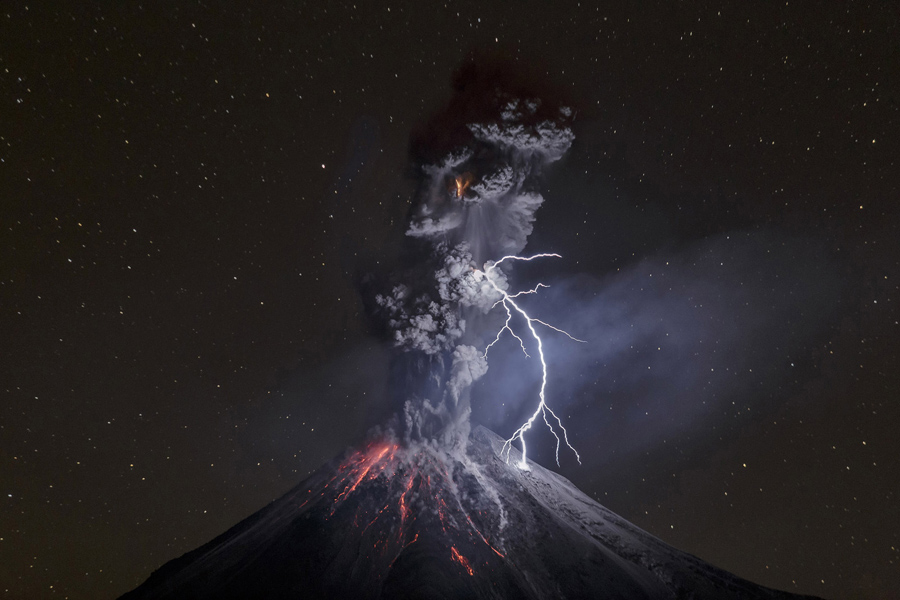 Mark
Mark became, in 2010, “
became, in 2010, “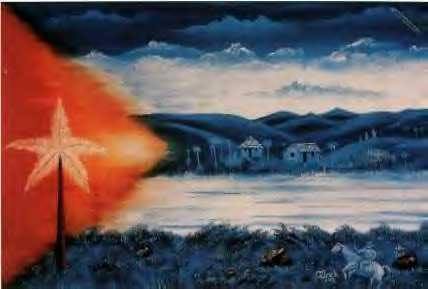 10 international airports in Cuba, that means there could be as many as 110 flights daily. —Laura Wagner,
10 international airports in Cuba, that means there could be as many as 110 flights daily. —Laura Wagner,  ¶ Left. Mural portrait In Baltimore of Trayvon Martin, killed in February 2012 by George Zimmerman. Martin would have been 21 this year on 5 February.
¶ Left. Mural portrait In Baltimore of Trayvon Martin, killed in February 2012 by George Zimmerman. Martin would have been 21 this year on 5 February. just before the U.S. invaded Iraq, Defense Secretary Donald Rumsfeld suggested the war’s total cost would be “something under $50 billion.” And the US, he added, would share that bill with its allies.
just before the U.S. invaded Iraq, Defense Secretary Donald Rumsfeld suggested the war’s total cost would be “something under $50 billion.” And the US, he added, would share that bill with its allies. Background. The median household income in Mountain Home is $131,281; median home value is $542,800; poverty rate is 2.6%; population is 97% white. While in Birmingham: median household income is $31,445; median home value, $85,000; poverty rate, 31% (50% for children); population rate, 70% African American. —see Audie Cornish,
Background. The median household income in Mountain Home is $131,281; median home value is $542,800; poverty rate is 2.6%; population is 97% white. While in Birmingham: median household income is $31,445; median home value, $85,000; poverty rate, 31% (50% for children); population rate, 70% African American. —see Audie Cornish,  the universe.” —17th century French mathematician, physicist and philosopher Blaise Pascal
the universe.” —17th century French mathematician, physicist and philosopher Blaise Pascal the release of gruesome photos of abuse and torture in Iraq’s Abu Ghraib prison, a ranking U.S. Senator responded this way to a reporter’s question: “This is not Sunday school. This is interrogation. This is rough stuff.” —read Ken Sehested’s “
the release of gruesome photos of abuse and torture in Iraq’s Abu Ghraib prison, a ranking U.S. Senator responded this way to a reporter’s question: “This is not Sunday school. This is interrogation. This is rough stuff.” —read Ken Sehested’s “
 ¶ Confession. “Day of judgment, God is calling / On their knees the war pig's crawling / Begging mercy for their sins / Satan laughing spreads his wings / oh lord yeah!” —“
¶ Confession. “Day of judgment, God is calling / On their knees the war pig's crawling / Begging mercy for their sins / Satan laughing spreads his wings / oh lord yeah!” —“
 deism,” encouraging school children’s “love of country,” and serving “commercial interests”—when the Soviet Union and its officially-atheistic constitution became Enemy No. 1. —See Kevin M. Kruse’s detailed documentation in his book, One Nation Under God: How Corporate America Invented Christian America.
deism,” encouraging school children’s “love of country,” and serving “commercial interests”—when the Soviet Union and its officially-atheistic constitution became Enemy No. 1. —See Kevin M. Kruse’s detailed documentation in his book, One Nation Under God: How Corporate America Invented Christian America. ta Claus with no hard evidence as well.
ta Claus with no hard evidence as well. Summerfield put it. —Jonathan P. Herzog, The Spiritual-Industrial Complex: America’s Religious Battle Against Communism in the Early Cold War
Summerfield put it. —Jonathan P. Herzog, The Spiritual-Industrial Complex: America’s Religious Battle Against Communism in the Early Cold War (which, currently, is the meaning behind most public use of the word freedom).
(which, currently, is the meaning behind most public use of the word freedom). God We Trust” on US currency) ruled that the phrase “in God we trust” has no “religious significance,” and its meaning is reduced to “spiritual and psychological value” of a certain “inspirational quality.” Citing an earlier court decision (Engel v. Vitale, 1962), the court affirmed that prayer in public schools and other “patriotic and ceremonial” occasions are merely an encouragement of school children “to express love for our country.”
God We Trust” on US currency) ruled that the phrase “in God we trust” has no “religious significance,” and its meaning is reduced to “spiritual and psychological value” of a certain “inspirational quality.” Citing an earlier court decision (Engel v. Vitale, 1962), the court affirmed that prayer in public schools and other “patriotic and ceremonial” occasions are merely an encouragement of school children “to express love for our country.” Randy Forbes (R-Va.) made the motion to reaffirm, again, “In God We Trust” as the nation’s motto and encourage its display in all public schools and government buildings, saying Americans need “that kind of inspiration” in tough economic times.
Randy Forbes (R-Va.) made the motion to reaffirm, again, “In God We Trust” as the nation’s motto and encourage its display in all public schools and government buildings, saying Americans need “that kind of inspiration” in tough economic times. ¶ Hymn of praise. “
¶ Hymn of praise. “
 Kenya, arranged by Shawn L. Kirchner.
Kenya, arranged by Shawn L. Kirchner.  capital city by the time it is finished in 2018, and provide electricity for 1.1 million people. . . . [saving] hundreds of thousands of tonnes of carbon emissions per year.” —
capital city by the time it is finished in 2018, and provide electricity for 1.1 million people. . . . [saving] hundreds of thousands of tonnes of carbon emissions per year.” — norms.
norms. ords of assurance. “If your world has only done you wrong / And all you find yourself is all alone / And if there's no one there to see you through / I'll be there for you.” —The Mavericks,
ords of assurance. “If your world has only done you wrong / And all you find yourself is all alone / And if there's no one there to see you through / I'll be there for you.” —The Mavericks, 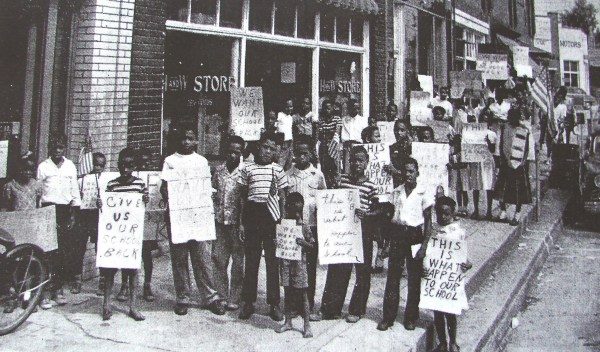 children marching down main street (see the photo at right), carrying signs like “We want our school back,” in opposition to the county’s decision to close the Catawba View Grammar School. —read more of
children marching down main street (see the photo at right), carrying signs like “We want our school back,” in opposition to the county’s decision to close the Catawba View Grammar School. —read more of  ¶ This, too, is to be learned in Lent. “On Judgment Day God will hold us accountable for the permitted pleasures we failed to enjoy.” —Jerusalem Talmud
¶ This, too, is to be learned in Lent. “On Judgment Day God will hold us accountable for the permitted pleasures we failed to enjoy.” —Jerusalem Talmud icons—in my case two of this year’s five “Public Peace Prize” recipients: Marie Dennis, co-president of Pax Christi International, and Michael Lapsley, a South African priest who works with victims as well as authors of apartheid and other forms of repression (and a recent guest preacher for my congregation). Read more about all
icons—in my case two of this year’s five “Public Peace Prize” recipients: Marie Dennis, co-president of Pax Christi International, and Michael Lapsley, a South African priest who works with victims as well as authors of apartheid and other forms of repression (and a recent guest preacher for my congregation). Read more about all 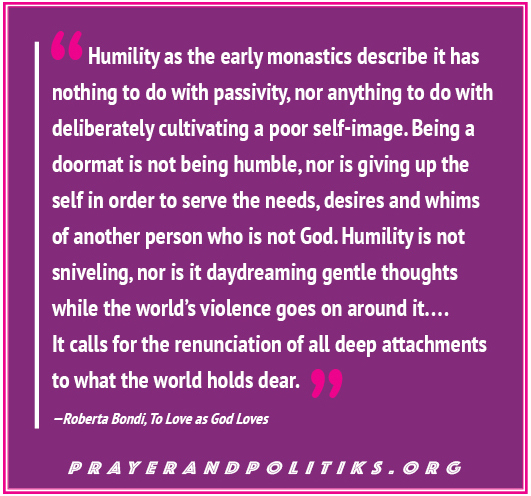 acts. . . . I go there, but when I do, I’m reminded of Robert Capon saying we’re like oysters trying to explain ballerinas." —Barbara Brown Taylor
acts. . . . I go there, but when I do, I’m reminded of Robert Capon saying we’re like oysters trying to explain ballerinas." —Barbara Brown Taylor hold cultural authority and privilege.” —
hold cultural authority and privilege.” — rendition of the poem
rendition of the poem ¶ Processional.
¶ Processional. 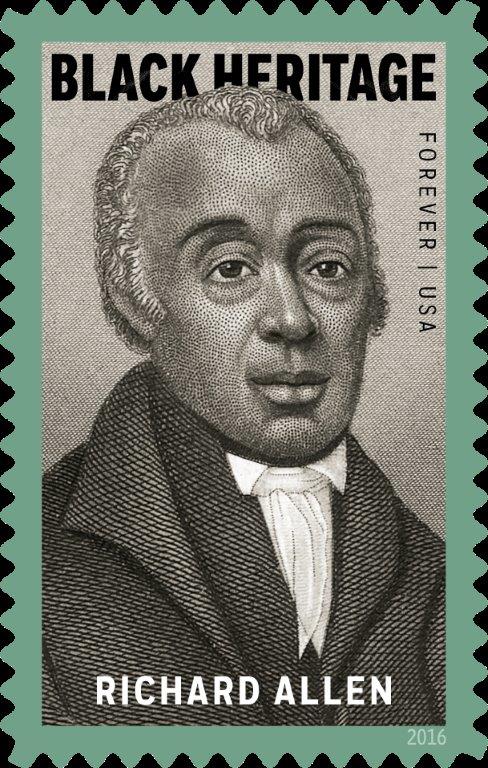 ¶ The Reverend Richard Allen, founder and first bishop in the African Methodist Episcopal (AME) Church, founded 200 years ago in the US, is the US Postal Service’s featured portrait for their Black History Month commemorative stamp. —for more information see
¶ The Reverend Richard Allen, founder and first bishop in the African Methodist Episcopal (AME) Church, founded 200 years ago in the US, is the US Postal Service’s featured portrait for their Black History Month commemorative stamp. —for more information see 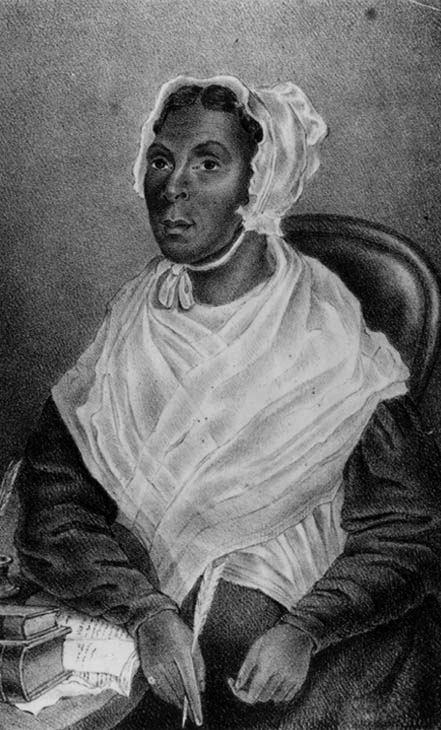 ican American woman to have an autobiography published in the United States. She was also the first woman authorized to preach by Richard Allen, founder of the African Methodist Episcopal Church in 1819. Despite Allen's blessing, Lee continued to face hostility to her ministry because she was black and a woman. She became a traveling minister, traveling thousands of miles on foot.”
ican American woman to have an autobiography published in the United States. She was also the first woman authorized to preach by Richard Allen, founder of the African Methodist Episcopal Church in 1819. Despite Allen's blessing, Lee continued to face hostility to her ministry because she was black and a woman. She became a traveling minister, traveling thousands of miles on foot.” 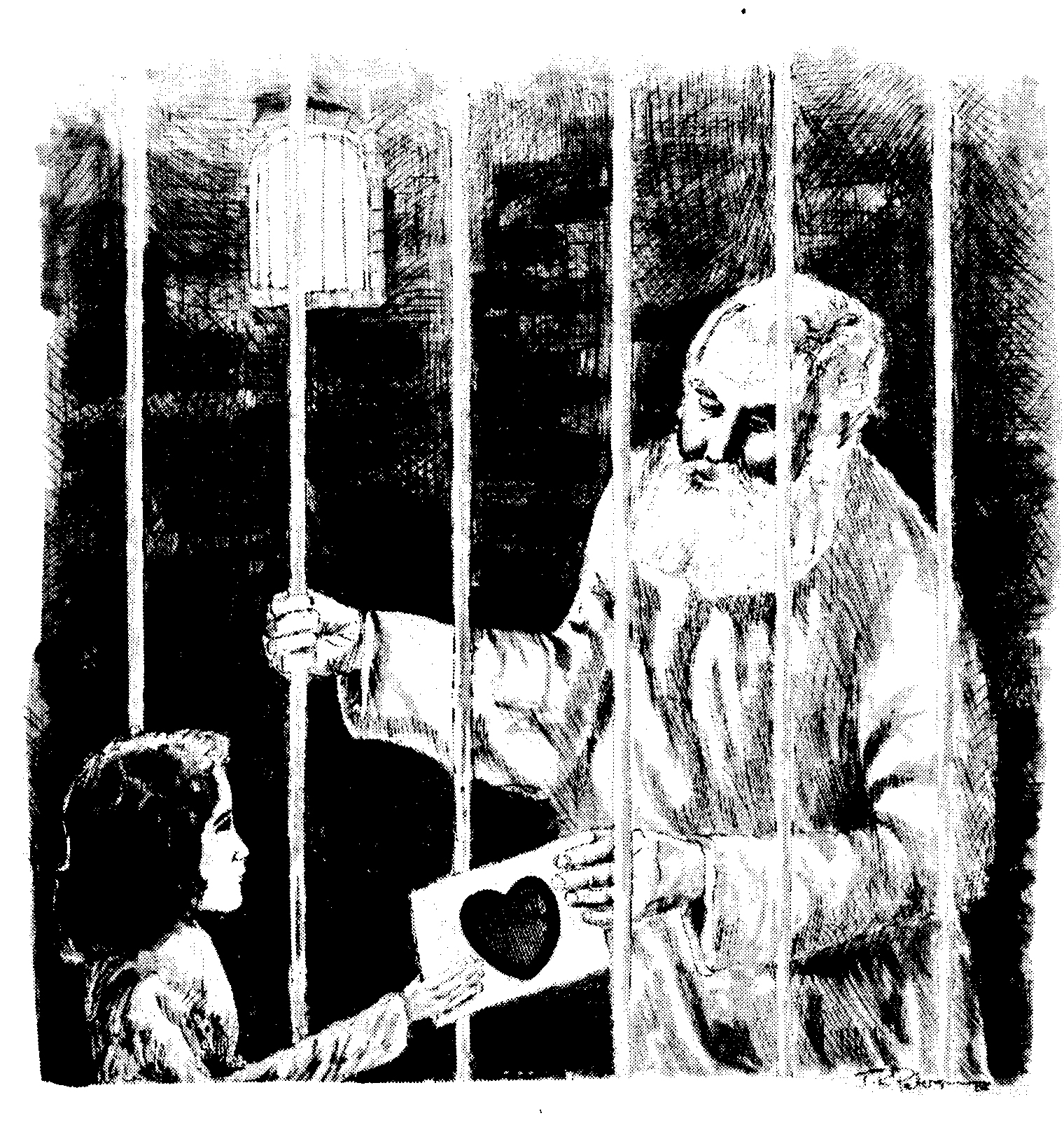 the thought of smudging ashes on the forehead in the shape of a cross. Most, even in the church, shy away from the mark of crucifixion. Instead of the body-broken, blood-spilt meal which Jesus offered, most prefer the empty calories of candy. Valentine candy is the Gospel of our culture.” —Ken Sehested
the thought of smudging ashes on the forehead in the shape of a cross. Most, even in the church, shy away from the mark of crucifixion. Instead of the body-broken, blood-spilt meal which Jesus offered, most prefer the empty calories of candy. Valentine candy is the Gospel of our culture.” —Ken Sehested chocolate-floral-lingerie industrial hydra.” —
chocolate-floral-lingerie industrial hydra.” —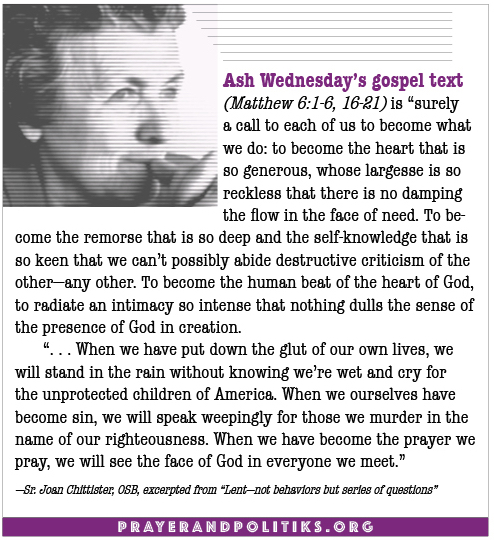 the earth / Keeps on turning / Night turns to day / And every new morning / Mercies come round.” —“
the earth / Keeps on turning / Night turns to day / And every new morning / Mercies come round.” —“ Muslims were, at the beginning, the litmus test for whether the reach of American constitutional principles would include every believer, every kind, or not." —Denise Spellberg, author of Thomas Jefferson's Qur'an: Islam and the Founders
Muslims were, at the beginning, the litmus test for whether the reach of American constitutional principles would include every believer, every kind, or not." —Denise Spellberg, author of Thomas Jefferson's Qur'an: Islam and the Founders gotten very ho-hum about their faith.
gotten very ho-hum about their faith.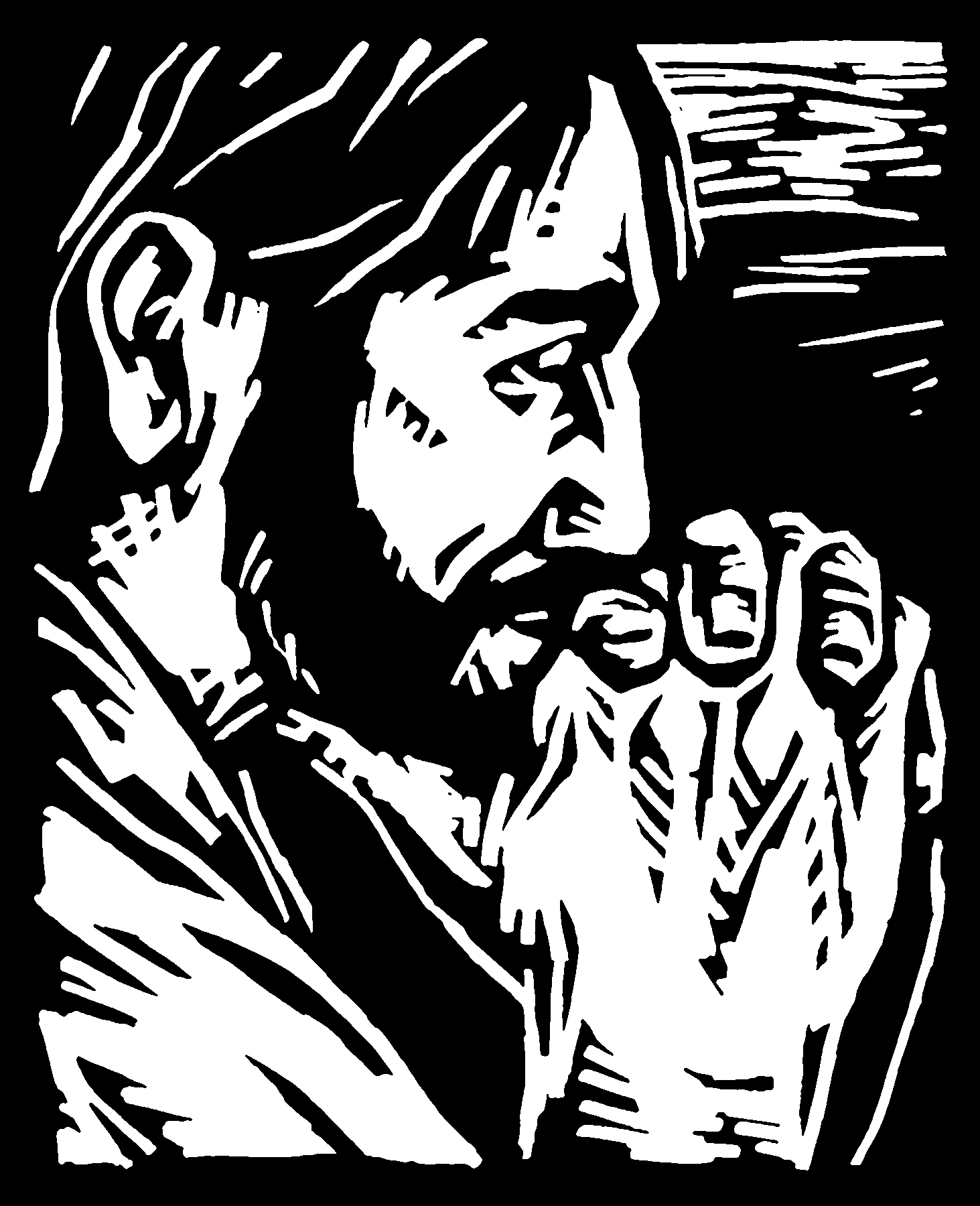 Street Baptist Church in Birmingham, Alabama, to face police dogs and fire hoses. But some are for sauntering and slow dancing like “
Street Baptist Church in Birmingham, Alabama, to face police dogs and fire hoses. But some are for sauntering and slow dancing like “